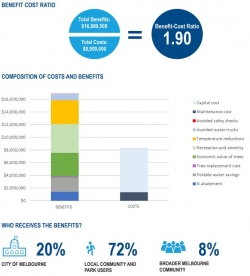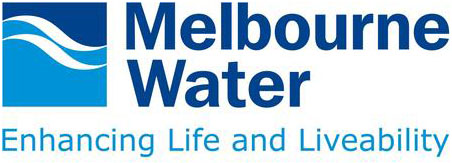resource library
Array
Benefit Cost Ratio
Cost Benefit Analysis for Princes Park Stormwater Harvesting Concept
Consultant
Princes Park, 240-564 Royal Parade, Carlton North VIC 3054 | Map:
Published: 14 September 2022
Project Overview
A cost-benefit assessment was undertaken as part of an internal preliminary business case evaluation by City of Melbourne for a proposed stormwater harvesting scheme at Princes Park.
The proposal was to extract excess stormwater runoff from Moonee Ponds Creek for irrigation of parkland and trees in Princes Park and on Royal Parade. The cost-benefit assessment was based on the concept design report for the scheme and on preliminary performance estimations prepared for City of Melbourne.
The cost-benefit assessment piloted the use of the Investment Framework For Economics of Water Sensitive Cities (INFFEWS) tools developed by the Cooperative Research Centre for Water Sensitive Cities, which include a benefit-cost assessment framework and a database of research studies relevant to the economic evaluation of benefits related to green infrastructure and water management.
The use of INFFEWS tools allowed a preliminary cost-benefit analysis to be undertaken quickly and at relatively low cost, utilising existing research studies to evaluate direct and indirect benefits delivered by water sensitive investments, including economic evaluation of social and environmental benefits using a Benefit Transfer approach.
Drivers and Objectives
- Evidence-based decision making at a preliminary stage: The proposed scheme was a concept at the time, and City of Melbourne wanted to make an informed decision on whether it was worthwhile moving to the detailed design stage by understanding the business case for the project. At this stage, a full economic assessment was not justifiable, but it would be helpful to be able to articulate the costs and benefits at a high-level to gain internal support and to make an informed decision on whether to proceed to the next stage of design.
- Holistic appraisal of benefits: Undertaking a benefit-cost assessment allowed the City of Melbourne to holistically evaluate the stormwater harvesting scheme at Princes Park. Commonly, stormwater harvesting schemes are assessed using financial assessment, looking at directly quantifiable benefits to council. This however neglects broader social and environmental benefits to local communities. Through a holistic economic assessment some of these benefits can be monetized based on research, and values observed elsewhere can be utilized using a benefit transfer method.
Organisations
Local Council: City of Melbourne
Consultants:E2Designlab
Project Outcomes
The cost-benefit assessment compared two situations over a 50-year time horizon: the situation with the stormwater harvesting scheme in place and the situation without the scheme. For the purposes of this assessment, a future drought scenario was assumed within the assessment time horizon, to explore the resilience benefits that the scheme could offer. As was the case in the Millennium Drought, City of Melbourne would be required to truck in recycled water to supply a basic level of service, but the use of sporting grounds will be restricted and mature trees will die prematurely.
The preliminary cost-benefit analysis predicted a benefit-cost ratio of 1.9 with a range of benefits to Council and the community, thereby warranting further investigation.
Quantifiable benefits of the stormwater harvesting scheme that were monetised includes:
- Potable water savings of 56ML/yr.
- Reduction in pollution of Moonee Ponds Creek and Port Phillip Bay.
- Maintained recreation and amenity value for 25,000 users per year during periods of drought.
- Avoided premature death of 44 trees per year during a major drought.
- Avoided trucking 12.4ML/year of water from elsewhere during drought.
- Avoided 13 additional sporting ground safety checks per year during drought.
- Maintained cooling benefit to 25,000 users per year during periods of drought.
The assessment only included benefits that could be evaluated and monetised with reasonable confidence at this early design stage, however other benefits of the scheme that have not been monetised could include:
- Avoided closure of sporting grounds.
- Maintained physical and mental health benefits of green space.
- Improved soil condition.
- Reduced flood risk.
Lessons Learnt
- Exploratory workshop: For a successful benefit-cost assessment, most of the work happens before a spreadsheet is opened and it is important to clearly define the inputs and parameters beforehand. It is also important to take stakeholders on the journey and collaboratively identify and test relevant assumptions and benefits. To do this, the consultant held a workshop with various department representatives from Council to identify the benefits and to clearly define the 'with project' and 'without project' scenarios.
- INFFEWS tools: The INFFEWS values tool is a simple database of economic studies which can assist practitioners in finding suitable values for various benefits that can be included in a cost-benefit through a value transfer methodology. The INFFEWS cost-benefit tool can then be used to calculate a benefit-cost ratio and apportion benefits to stakeholders. Guidance on use of the tools is available from the CRC for Water Sensitive Cities.
- Simple business case summary: The simple summary produced supported broader understanding and informed decision making within Council, and was more accessible than a full economic study report.
Project Cost
The workshop, preliminary cost-benefit analysis and a summary document were delivered using the INFFEWS tool suite and existing concept design reports for a consultant fee of approximately $10,000
Timeframe
The analysis was conducted in 2019 over a period of 2 months.
Contact
Celeste Morgan
T: 0428499577
Acknowledgements
City of Melbourne
